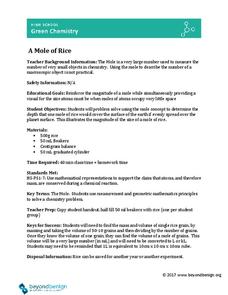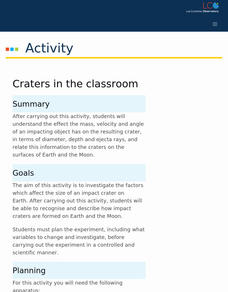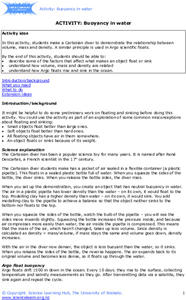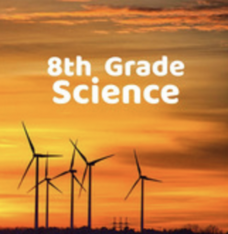Curated OER
Deep Impact Comet Encounter
Physics apprentices analyze the impact of NASA's Impactor as it collided with the comet Tempel 1 in July of 2005. They calculate the mass and speed of the comet, along with the distance it might drift off of its orbit over time. This...
Curated OER
Determining the Density of a Liquid
Young scholars find the density of diet soda and regular soda. In this density lesson plan, students measure the mass of a graduated cylinder with 10 different volumes of each soda. They find the mass of the liquid alone and use the...
Beyond Benign
Mole of Rice Activity
Learning about the mole using rice is pretty nice! Help your chemistry scholars visualize the concept of a mole of substance with an easy-to-perform lab. Partnered pupils find the mass of a single grain of rice and relate this...
PBS
What's the Matter? | UNC-TV Science
Explore what makes up the universe and demystify the complex ideas of matter and the atom. Group members watch a video with explanations, animations, and examples that discuss the characteristics and importance of matter. Scholars then...
American Museum of Natural History
Space Jell-O
A tasty treat lends its curious substance to space exploration. Mimicking the discoveries of Albert Einstein, young astronomers beginning by making a batch of Jello-O, then four hours later, scholars place edible objects that act like...
American Chemical Society
Conservation of Mass
It may take up less space, but the mass stays the same. Tackle a common misconception about conservation of mass using a hands-on lesson. Learners measure the mass of substances before and after melting, dissolving, and undergoing a...
Las Cumbres Observatory
Craters in the Classroom
Laws of motion apply both in space and on Earth. Young experimenters model object impact on the Earth and moon. They use data to determine the effect mass and velocity have on the resulting craters and how that relates to the energy of...
Las Cumbres Observatory
Down2Earth: Making Impact Craters
Is the sky falling? Learners use a simulator to modify the mass and velocity of asteroids and collect data on how they influence the diameter and depth of the impact crater. They use their results to draw conclusions and make predictions...
Las Cumbres Observatory
Star In a Box
Stars may all look the same from down here, but their surfaces tell a different story. Using an animation, learners collect data about the temperature and luminosity of stars and compare them to their mass and radius. They then answer...
Teach Engineering
Flight of the Fruit: Weight, Gravity and Imagination
Beware the falling fruit. Scholars design and build parachutes that can help protect fruit as it falls. They test out their creations, learning about gravity, weight, air resistance, and measurement concepts along the way.
University of Waikato
Buoyancy in Water
Change where an object floats in water. Pupils experiment with a Cartesian diver by squeezing on the side of a plastic bottle. Learners pay attention to the bulb of the pipette as the bottle is squeezed to determine what is happening...
University of Waikato
Density
Will the block float? Pupils take measurements to calculate the volume of various blocks of different materials. Using a scale, they determine the mass of each block and then calculate their densities. Scholars finish by ranking the...
American Museum of Natural History
Space Jell-O
Might as well learn about how space bends around massive objects while making dessert. A remote learning resource provides an opportunity for scholars to model how stars and planets bend space. They use Jell-O to represent space and...
American Museum of Natural History
Space and Time
Carve out some time to learn about space-time. Young scientists use a remote learning resource to read up on the relationship between space and time. They consider the idea of relativity, see how objects with a large mass can bend space...
CK-12 Foundation
CK-12 Middle School Math Concepts - Grade 6
Twelve chapters cover a multitude of math concepts found in the Common Core standards for sixth grade. Each title provides a brief explanation of what you will find inside the chapter—concepts from which you can click on and learn more...
Utah Education Network (UEN)
Utah Open Textbook: 8th Grade Science
The cycle of energy is important to many different systems on Earth. Scholars use questioning and observation to investigate the differences between renewable and non-renewable resources and how they relate to global changes. They...
Purdue University
Designing a Device Utilizing a Balloon Filled with Carbon Dioxide
Don't waste all that carbon dioxide. Scholars first produce carbon dioxide by mixing baking soda and vinegar. They measure the masses of the reactants and products to verify the law of conservation of mass. As a culminating activity,...
Purdue University
Recycling Paper
Build an appreciation for the green movement by recycling your own paper! Learners participate in a STEM instructional activity by learning about the process of recycling paper and then designing their own models. Their ultimate task is...
Purdue University
The Case of the Pilfered Pin: A Measurement Inquiry Activity
Who pilfered the pin? Scholars practice measurement skills as they solve the mystery of a stolen pin. They measure length, temperature, and mass and determine which of select suspects committed the crime. During the STEM hands-on...
Purdue University
Can You Design and Construct a Better Candy Bag?
Bag the sweet resource for later use! Pupils learn about engineering design by developing a new, improved bag for candy from thin plastic sheets or from paper. The bags are to be visually appealing, but should also be functional. To...
Corbett Maths
Density
A short video introduces the triangle that illustrates how to find any value given the other two in the density formula. Class members use the triangle to work several problems to find the mass, volume, or density of an object.
Mathed Up!
Compound Measures
Compounding is dividing units. Pupils practice using compound measures such as units for speed and density to solve problems that range from straightforward speed problems to those requiring conversions. The last few items challenge...
PBS
Super Bear: Comparing Mass
A super bear is a whole lot of gummy bear. Scholars hone their estimation skills by completing an activity. Given the masses of a mini gummy bear and a regular gummy bear, they must determine the number of each needed to have the same...
Howard Hughes Medical Institute
Determining the Size and Energy of the K-T Asteroid
Two different groups of scientists published scientific papers in 1980 offering proof of a large asteroid hitting Earth between the Cretaceous and Tertiary layers of ground. Scholars use a worksheet to analyze the same type of data as...

























